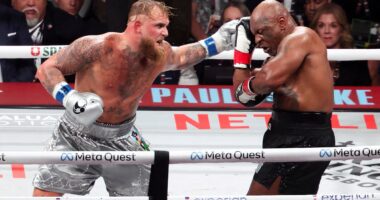His wife, Eliane, raced down in a bid to stop them. “They were new to the area in fairness,” Hogan recalls now with good humour. “I’m not sure the final was too high on their list of priorities.” The relationship between sleep and performance is well-established. The vast majority of players are conscious of its impact on their wellbeing. Yet the gulf between that theory and the reality is vast. It is something everyone pursues and it can still prove extremely difficult to achieve, like winning itself. Hogan had a habit of dozing off on the bus to big games. Amongst his teammates, it appeared an unintended gig. For him every wink was considered. “I wasn’t going into a deep sleep now, but it was a way for me to relax. Music had the opposite effect on me, it’d wind me up. It was a way of maintaining an even keel really. You are just trying to retain energy. Even chatting on the bus, I found that draining. Some lads love the craic and it gives them energy. “It was a joke with the lads, ‘Hoggie is gone already before we’re even on the motorway.’ But it was my way of preparing.” So, what impact did it have when he was awoken by a drunken ballad? “It wouldn’t be great. I see it now as a manager, anything that throws them out… We all have a bit of OCD. It depends on how extreme it gets. Players can be particular about boots or sitting in a certain place on the bus. Some won’t put the jersey on until just before you walk out. From a science point of view, it is probably fine but it the mental thing. That day thankfully didn’t affect me too bad. “It’s about routine. It is why some teams stay in Carton House because they train there. It is familiar. You have an experience sleeping there. It is why others fly up the morning of the game. The last thing you want is to change your routine. Aside from that, you can’t beat your own bed.” According to a recent paper by ATU Galway MSc graduate Matt Moran, 67% of GAA players suffer from poor sleep. At the elite level, 60% of males and 71% of females were categorised as poor sleepers. Players filled in a Pittsburgh Sleep Quality Index, a standardised self-report questionnaire that monitored everything from sleep quality and duration to medication. “There is only one other study that looked at elite athletes,” Moran explains. “We included females and sub-elite athletes as well. The problem is that it is massively difficult to get objective data. It is hard to go into someone’s bedroom and monitor their sleep. The methods are quite expensive, you need massive funding behind you. Video monitoring sleep, you need to be in that person’s bedroom with a huge volume of equipment and monitoring them physiologically.” After Tyrone’s Conor Meyler won an All-Ireland and All-Star in 2021, he revealed that he had invested in taking a cold bath, opening all windows in his room and taping his mouth closed to improve sleep. In an era with immense investment in the one percenters, Moran stresses inter-county setups shouldn’t lose sight of the bigger picture. “One thing I would say, it can fall through the cracks. These setups have nutritionists, doctors, physio, S&C and psychologists. Who is responsible for sleep? “Essentially, when athletes come in at preseason or throughout the year, management should be aware of the implications of sleep. Screen the athletes, know who is in charge of sleep in performance. “You can use an athlete sleep screening test. That would help manage those most at risk of health issues. This is foundational.” Down captain Pierce Laverty always knew what he wanted to do. Play for Down, follow in the footsteps of his family in civil engineering works. He grew up in that world with diggers and plant hire. The industry isn’t always conducive to Gaelic football. Laverty is a site engineer. He relies on the data from a WHOOP band to make sure the early morning starts don’t affect his on-field efforts. “I would be a good sleeper. We’ve had the WHOOP for two years and have a group amongst the team. We’d all try get involved in it. It just makes you conscious of what you are doing. Things you can do for your recovery. I’ve no problem getting to sleep now. I wear blue light glasses every night for an hour or two. I take magnesium before I go to bed. All the small stuff, don’t eat before I go to bed, go to bed hydrated, consume no caffeine after 4.” He didn’t settle in a content place overnight. It took time, trial and error. He read research. He bought a new mattress and black-out curtains. Perfect recovery is the ultimate ambition. It has been an internal competition. “We’d be competitive about it now. We could land into training and I might say to Daniel Guinness, ‘see you’d a bad night’s sleep last night.’ Someone had a night at the girlfriend’s house and they aren’t as well rested. There would be a wee bit of competitiveness about it. You can’t see everyone’s data but you can see general stuff like heart rate, recovery. Who’s strain is higher, which is basically based on your peak physical exertion.” There are so many pieces to the puzzle. Social media. Caffeine consumption. The basic composition of being a GAA player. Training in the evening when the general public are beginning to wind down. Meal timing compromised because of that. Not to mention the significant cohort who commute to and from each session. Donal O’Sullivan had logged a decade with Limerick before he retired last year. His day job is working as a GP. “We’d an interesting talk with John Kiely. He said that they always looked at the routine leading up to a performance, especially if someone didn’t play well. In the lead-up to the game, did they change their routine? “In the clinic, sleep can be a symptom of anxiety, depression, stress, burnout. It is about tackling those first of all. We would start at the routine.” With more research will come a better understanding. For O’Sullivan, the conversation shouldn’t be about how a player copes with one bad night’s sleep before a match. If enough deposits are paid over the course of a week, the reserves won’t run empty because of a night’s poor return. “I think sleep, with WHOOP and everything, is something people talk about in high performance but in my own experience, lads don’t share if they are sleeping poorly. There is still a fear of vulnerability, maybe a stigma attached to it. The nature of high-level sport is everyone is competing against each other. It is an issue for the general population so of course GAA players are no different. “Plenty of lads drink coffee before a game or take caffeine tablets. The nature of work in general, coffee is part of that socially. It is timing it properly and even that is one part of the puzzle. Some people have a higher tolerance too. “I go back to the start with this. When you are fatigued, you can be in a bad state, especially if it is a chronic issue. It can compound itself. “Everyone has had poor sleep and if you don’t get back on track, it gets worse and worse. With something like sleeping tablets, you build up a tolerance and it is a medication with dependency issues. They don’t help with restful sleep either. They might knock you out, but you won’t wake up refreshed which is important for sport. “If it’s an issue, it’s about getting to the root cause.”
Subscribe
Login
0 Comments





